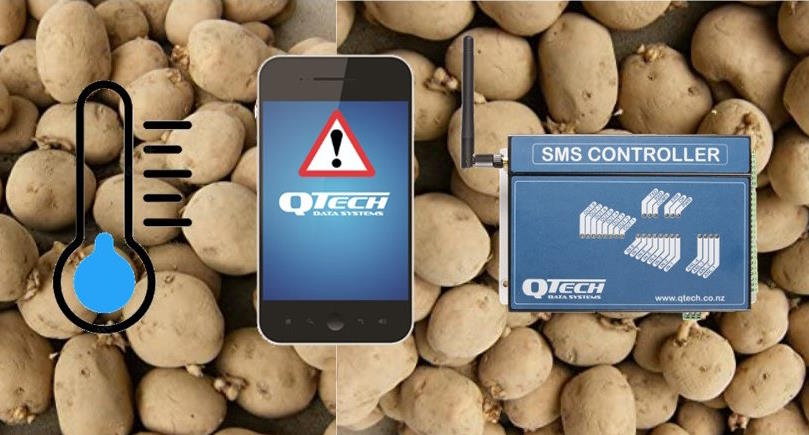Our 4G cellular SMS controller is used to monitor a client’s cold room.
The cold room is used to store high value seed potatoes. Seed potatoes need to be kept cold and dry for long periods each year, to ensure they are ready for next season’s crop.
Power outages are becoming more common, so a way to remotely monitor the status and temperature of the cold room is needed.
The site has good 4G coverage so a Cellular SMS system would be a simple and appropriate solution, especially as there is no Wi-Fi signal on site.
An extract from our client’s specification:
We need periodic alerts letting the farmer know the cold room is ‘healthy’ and the refrigeration compressor is running. I would also be looking for alerts letting the farmer know of failures, and which failure specifically. I’d estimate 4 – 5 events triggering an alert text message. A remote start would be required with a confirmation text, and a remote reset would also be required. Another key factor would be the cold room temperature. I’d love for the farmer to get an SMS with the current temperature periodically, that way he knows where he is at. Two staff phones would be set up to receive alerts, but we must have the ability to change these numbers as needed. Is this an easy to arrange function for the farmer to manage going forward?
The antenna selection for this application is crucial. The cold room construction uses a lot of metalwork, so an outside mounting antenna is needed. The cold room roof is also extra tall so a custom 10m length antenna system is used.
Please contact us now to discuss your cold room remote monitoring requirements and how our technology can help.
Our popular SMS Lite has four inputs for monitoring equipment and two relays for control.
Always keep potatoes in a dry, frost-free area with good ventilation.
While professional potato growers understand all the best practises, if you are storing seed potatoes at home,
this advice from Potatoes NZ is very useful:
*Store potatoes between 5-10°C. Use a thermometer to ensure storage area is at the correct temperature.
*Keep potatoes away from strong smelling foodstuffs or chemicals.
*Clean store areas regularly.
*Avoid storing potatoes in strong light – natural or artificial – as they will turn green.
*Keep potato stacks low (no more than 6 bags high) to avoid squashing.
*Do not handle potatoes more often than is absolutely necessary as they bruise easily.
*Do not use potatoes if they feel damp in the bag.

